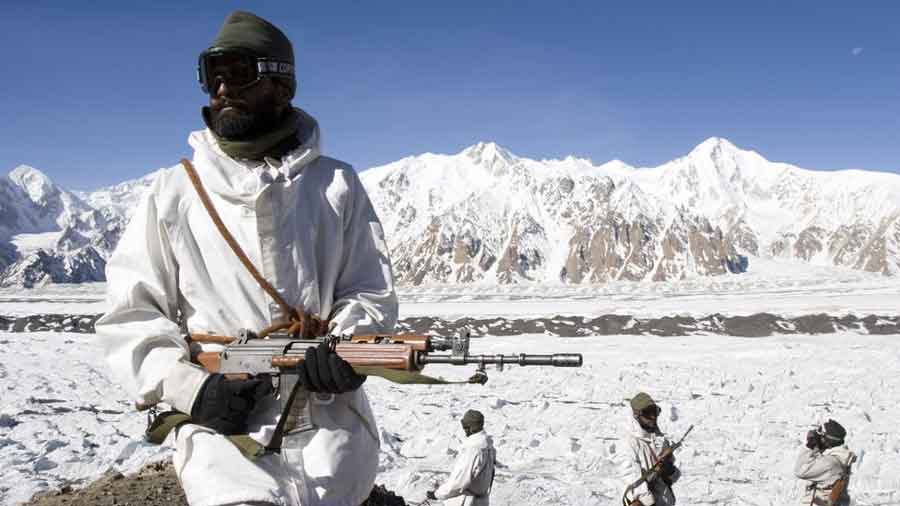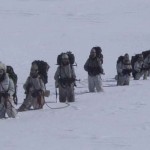IDR Blog
When commanders hear but do not listen
To most, hearing and listening are synonymous as both relate to the functions of the ear. However, the difference lies in the processing of the sound by the brain.
In the case of hearing, brain simply notices the sound. One hears a sound whether one wants to or not. In other words, one can hear something without wanting to; but one can only listen to something intentionally. For example, one hears a noise but listens to what is being said.
A vigilant and sympathetic commander takes note of the warning signals and activates the preventive mechanism.
Similarly, one can hear a conversation between two persons without listening to it. It implies absence of application of mind to that conversation. A sound is said to have been listened when the brain makes a conscious effort to take its cognizance and process it. Thus to listen to something, a deliberate effort is necessary.
When a child approaches a busy parent with a request/problem and gets a response, ‘I have heard you’. He is quick to realise that his parent heard him but did not listen to him. The child feels hurt and sulks. By not paying attention to the child, the parent missed an opportunity to resolve a small issue and prevent its growth into a major grievance. On the other hand, there are children who are introvert by nature and keep their emotions bottled up. In such cases, challenge for the parents is much tougher. They have to be on the lookout for tell-tale signs that may indicate their disquiet.
In many respects, command of troops is akin to the performance of parental functions. Unlike other organisations, relationship between a commander and the troops is governed by the ethical linkage of empathetic demeanor of the former and unflinching trust of the latter. Troops expect their commanders to be aware of the problems faced by them and treat them with due compassion. For that, every commander must strive to ‘listen to his command’. It is a command responsibility.
‘Listening to one’s command’ carries a much wider meaning in the services. In addition to listening to what is being said, a commander must pay equal attention to the unsaid as well. It entails managing both extrovert and introvert troops.
As many troops stay silent, it is essential that every commander remains fully conscious of the level of satisfaction of the troops. He must have his hand on the pulse of his command to get forewarning of festering undercurrents of disaffection lest they blow-up as disciplinary challenges.
Troops expect their commanders to listen to them and make a conscious effort to solve their personal, domestic and professional problems.
Indian soldiers are a highly disciplined lot. They do not resort to collective indiscipline or manhandle officers unless driven to it. When simmering discontentment (based on real or perceived issues) is overlooked by commanders, either through negligence or default, pent-up frustration results in a ‘pressure cooker effect’, tearing long-nurtured unit cohesion to shreds. Units afflicted by disorderly behaviour of troops take long to recover and the stigma tarnishes their proud regimental history for ever.
The Stress Factor
Although stress is a biological term, it is commonly used in a metaphorical sense and has also come to be accepted as a euphemism for describing difficulties faced by an individual. Every one faces challenges in life (professional, societal and domestic) and failure to adapt to them results in perceiving them as threats, which in turn generates pressures. Extreme pressures become stress. When stress surpasses ability to handle, it becomes a threat to both physical and emotional equilibrium, by generating ‘fight-or-flight’ response.
Military’s highly disciplined, hierarchal and restrictive environment deters giving vent to or sharing pent up frustrations. Howsoever disturbed a soldier may be he has to put up a façade of bravado. Such a situation lends itself to acts of desperation by some over-stressed and distressed soldiers. Increasing cases of indiscipline, suicides and fratricide are symptomatic of the malaise.
By listening to a stressed soldier, a commander provides him an escape valve before the threshold gets crossed. A vigilant and sympathetic commander takes note of the warning signals and activates the preventive mechanism. By listening to a soldier and empathizing with him, a commander assumes the role of a friend, guide and mentor. The soldier feels assured of his commander’s support and feels relieved of the distressing stress.
…shortage of officers, coupled with overloaded working environment, is certainly a contributory factor, it is more a case of neglecting command responsibilities.
Redressal of Grievances
As per the rules, all service personnel are allowed to seek audience with their commanders to apprise them of their complaint and seek redressal. In case not fully satisfied, they can submit written appeals to the Chief (non-statutory complaints) and the Government (statutory complaints). Unfortunately, all complaints get mired in bureaucratic minutiae. No officer has time or the inclination to listen to what the complainant is trying to say. The whole system is totally insensitive. In some cases, complainants retire before their cases are finally disposed off, making the whole exercise meaningless.
Most troops approach their commanders with their grievances through ‘Arzi Reports’ and ‘Sainik Sammelans’. Although these are time tested channels of communication, their effectiveness is directly proportional to the earnestness of the commanders. Troops expect their commanders to listen to them and make a conscious effort to solve their personal, domestic and professional problems. Many grievances get addressed once the commanders listen to the complaints attentively, understand them and explain the facts to the troops, thereby relieving them of their misplaced anxiety.
Finally
Increasing incidents of collective indiscipline do not portend well for the Indian army; in fact, they are ominous. It appears that the soldiers’ faith in the credibility of the system is beginning to wane. Close to one lakh cases involving service personnel are pending in various courts. It reflects poorly on the Army’s grievance redressal mechanism. Soldiers knock at courts’ doors only when driven to it as a last resort, after losing faith in the sense of justice and the fairness of the system. Equally worrisomely, the Indian Army has been rocked by a large number of suicide and fratricide cases. In most cases, officers’ had failed to take note of the increasing restlessness of the affected soldiers and listen to their murmurs of dissentions.
As stated earlier, one of the primary reasons for the emerging man-management issues is failure of the commanders to listen to their command. Whereas shortage of officers, coupled with overloaded working environment, is certainly a contributory factor, it is more a case of neglecting command responsibilities. It is not sufficient to hear the troops. Commanders must listen to their commands both through verbal communications and non-verbal indications. It is only then that they can initiate corrective measures well in time.
Post your Comment
6 thoughts on “When commanders hear but do not listen”
 Loading Comments
Loading Comments





Sir I m army medical corps nursing assistant my I card photo defaced for water my co given me severe reprimand I am not satisfied this punishment what can do I army rules according non statuary and stauary
THE OLD COLONIAL WAY OF COMMAND AND CONTROL HAS TO PAVE WAY FOR MODERN 21ST CENTURY ETHOS , COS AND OFFICERS AND SENIOR RANKS CANNOT HAVE DOUBLE STANDARDS WHERE THEY LIVE OFFTHE LAND , MISUSE NON PUBLIC FUNDS USE UNIT RESOURCES FOR PERSONNEL GAIN AND PELF , EMPLOY TROOPS FOR LABOUR JOBS AND YET EXPECT TO BE SALUTED AND RESPECTED . FOOD , CLOTHING SHELTER , SCHOOLING , TRANSPORT , MEDICAL FACILITIES , ENTERTAINMENT , COMPENSATION , RETENTION , RETIREMENT , INJURY , INSURANCE ALL NEED TO BE INCREASED MANY FOLD TO CURRENT STANDARDS FOR SATISFACTION AND COMBAT EFFECIENCY OR OTHERWISE LIKE THE INDIAN POLICE AND CONSTABULARY THE INDIAN ARMY WHICH IS HURTLING DOWN RAPIDLY WILL BECOME PANDUS GOOD FOR WEILDING LATHIS ONLY. THE GENERALS HAVE TO HIGHLIGHT THE DEFECIENCIES TO THE MODI GOVT AND SIDELINE THE BABUS IF ANY MEANINGFUL IMPROVEMENT HAS TO TAKE PLACE .
Avery good essay. I hope serving officers read and benefit from it. Failure to pay heed to this aspect of command is sure to demand a heavy price.
A “Nail on the head” by General Suman! Officers at all levels need to be sensitive and proud of the troops they command.
Maybe they (officers) do not get to see enough role models like The Cariappa’s or The Thimmaiya’s or the Manekshaw’s, during their formative years.
Maybe the background, the expectations, the attitude and the vision of the officers joining the Forces are different today. What priority does an average student give to joining the Armed Forces, as against doing Medicine, Engineering, MBA or Civil Services?
All these effects have a direct bearing on the character and the moral fabric of the young officer and we see the results.
Regards
Jani
Sir, The bane of the problem is multi fold with various facets playing up. Firstly the soldier of today is not the soldier of yesterday. We have to realise that we are not dealing with a peasant class individual who was just about fifth class pass. A lot of social changes have taken place in the native places form where the soldiers come. The percentage of urban inflow into the Army has increased. The spatial awareness of the soldier of today has increased many fold. Therefore our old approach to handling soldiers has to be discarded and we have to have a fresh approach to deal with them. The present day soldier unlike the old one doesn’t hold his officers in awe. He is more pragmatic in his approach to the service and his seniors. He is more materialistic in his way of life. Therefore our approach has to be remodelled on these factors.
The second issue is shortage of officers in the Army. In the yester years a young officer was nurtured under the tutelage of his Company Commander who was fairly senior in service and had a good 10 to 15 years of experience under his belt. This aspect is sorely lacking and these days a young officer on commissioning will invariably land up as a company commander. A kick upstairs with no experience and advice as a backup. The crucial man to man communication is missing; I do not blame the young officers as they are hard pressed in their duties. For the first five years a young officer will be tremendously busy with doing his mandatory courses and taking part in various professional and sports events that unit life throws up. So the crucial link between the officer and the soldier gets affected. I wouldn’t term it as command failure; it’s just not being able to cope up with the work load and being able to remould our man management policies. Let’s not always blame the CO’s; they are working under challenging circumstances. The Army as a whole has to look deeply into this issue. Regards JP.
I totally agree with JP. Officers have to change their style of leadership as the intake of soldiers is from a different strata now. Shortage of officers is also a major cause for worry. Please refer to my article titled “Shortage of officers is the root cause”, mentioned on this website.
Thanks Mrinal.